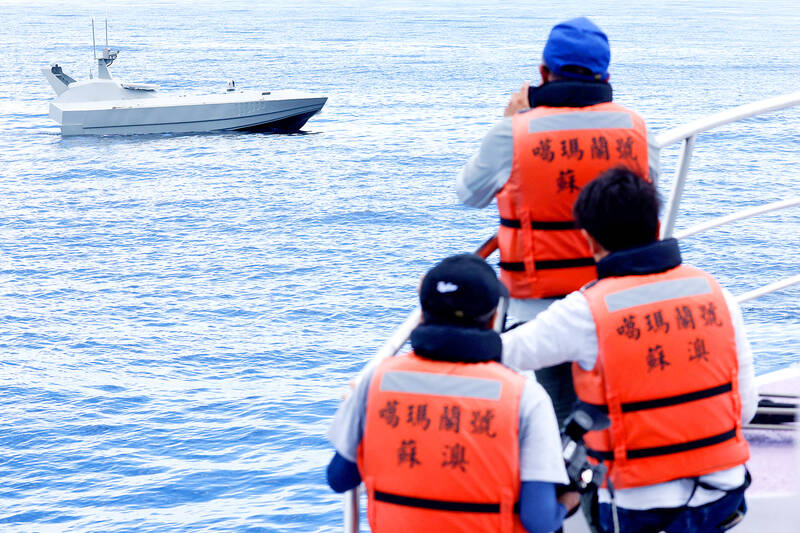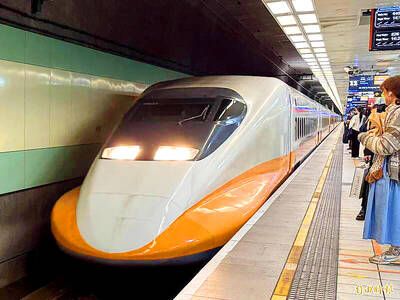Just off the small fishing port of Wushi (烏石) in Yilan County, a Taiwanese company is testing what could eventually be a powerful, but unglamorous new weapon in the nation’s military arsenal — sea drones.
Used to great effect by Ukraine in the Black Sea against Russia, Taiwan is learning lessons on how it could use sea drones as an effective and low-cost way to fend off any possible Chinese invasion.
These drones are uncrewed, remotely controlled small vessels that are packed with explosives and can be guided toward ships or potentially even attack targets in the air.

Photo: Ann Wang, Reuters
Pushed by the US, Taiwan has been working to transform its armed forces to be able to wage “asymmetric warfare” using mobile, smaller and often cheaper weapons that still pack a targeted punch, like sea drones.
“Uncrewed boats or vehicles have played a very significant role in the Ukraine war,” said Democratic Progressive Party (DPP) Legislator Chen Kuan-ting (陳冠廷), who sits on the Foreign Affairs and National Defense Committee.
“Uncrewed vehicles, whether they are boats or underwater vehicles, can effectively deter China because Taiwan is not the attacking side, we are the defending side,” he said.
Chungshan Institute of Science and Technology — the research and development arm of the Ministry of National Defense — has termed the sea drone plan the “Swift and Sudden” project, which has a modest budget of about NT$800 million (US$ 26.97 million).
Minister of National Defense Wellington Koo (顧立雄) on Wednesday said that sea drones would be included in an additional spending package to be unveiled later this year.
Details of that special budget have yet to be announced.
Thunder Tiger Corp chairman William Chen (陳冠如) told Reuters last week on a boat off Wushi while viewing a test of the company’s SeaShark 800 sea drone —which can carry 1,200kg of explosives and travel up to 500km — that these new weapons present an element of surprise for China.
“We can create uncertainty. We can fill the Taiwan Strait with danger and risks. No one knows where these dangers could surface,” Chen said.
Next week, Thunder Tiger is to join 11 Taiwanese and foreign companies in an exhibition just down the coast from Wushi arranged by the defense ministry to showcase uncrewed surface vehicles that might end up being added to Taiwan’s arsenal.
Other companies taking part include Taiwanese navy contractor Lungteh Shipbuilding and US military shipbuilder Huntington Ingalls Industries, the ministry said.
“Drones are a top priority for both the United States and Taiwan. Obviously the conflict in Ukraine is focusing minds on what the next generation of warfare will look like,” said US-Taiwan Business Council president Rupert Hammond-Chambers, who is leading a US defense industry delegation to Taiwan this week, including drone makers.
Since Russia invaded Ukraine in 2022, Taiwan has been studying how Kyiv has deployed drones to successfully offset Russia’s advantage on the battlefield and has enlisted commercial drone companies, including Thunder Tiger, to help.
Ukraine has deployed sea drones not only to attack ships in Russia’s Black Sea fleet, but also to shoot down aircraft.
Taiwan’s navy is dwarfed by that of China with its aircraft carriers and ballistic missile submarines, although the country lacks recent combat experience.
China’s last successful large-scale amphibious assault was in 1950, when it seized Hainan Island at the tail end of the Chinese Civil War, with troops ferried across on junks.
Peter Chen (陳柏宏), a drone expert and executive director of Taiwan security think tank Taiwan Military and Police Tactics Research and Development Association, said that Taiwan could undoubtedly make world-class sea drones.
“But when it comes to the application, how to turn them into top-notch weapons, it is not the responsibility of private companies. The views of government and the military on how to properly integrate the weapons into the battle strategy, that needs more thinking,” he said.

The inspection equipment and data transmission system for new robotic dogs that Taipei is planning to use for sidewalk patrols were developed by a Taiwanese company, the city’s New Construction Office said today, dismissing concerns that the China-made robots could pose a security risk. The city is bringing in smart robotic dogs to help with sidewalk inspections, Taipei Deputy Mayor Lee Ssu-chuan (李四川) said on Facebook. Equipped with a panoramic surveillance system, the robots would be able to automatically flag problems and easily navigate narrow sidewalks, making inspections faster and more accurate, Lee said. By collecting more accurate data, they would help Taipei

TAKING STOCK: The USMC is rebuilding a once-abandoned airfield in Palau to support large-scale ground operations as China’s missile range grows, Naval News reported The US Marine Corps (USMC) is considering new sites for stockpiling equipment in the West Pacific to harden military supply chains and enhance mobility across the Indo-Pacific region, US-based Naval News reported on Saturday. The proposed sites in Palau — one of Taiwan’s diplomatic allies — and Australia would enable a “rapid standup of stored equipment within a year” of the program’s approval, the report said, citing documents published by the USMC last month. In Palau, the service is rebuilding a formerly abandoned World War II-era airfield and establishing ancillary structures to support large-scale ground operations “as China’s missile range and magazine

A 72-year-old man in Kaohsiung was sentenced to 40 days in jail after he was found having sex with a 67-year-old woman under a slide in a public park on Sunday afternoon. At 3pm on Sunday, a mother surnamed Liang (梁) was with her child at a neighborhood park when they found the man, surnamed Tsai (蔡), and woman, surnamed Huang (黃), underneath the slide. Liang took her child away from the scene, took photographs of the two and called the police, who arrived and arrested the couple. During questioning, Tsai told police that he had met Huang that day and offered to

BETTER SERVICE QUALITY: From Nov. 10, tickets with reserved seats would only be valid for the date, train and route specified on the ticket, THSRC said Starting on Nov. 10, high-speed rail passengers with reserved seats would be required to exchange their tickets to board an earlier train. Passengers with reserved seats on a specific train are currently allowed to board earlier trains on the same day and sit in non-reserved cars, but as this is happening increasingly often, and affecting quality of travel and ticket sales, Taiwan High-Speed Rail Corp (THSRC) announced that it would be canceling the policy on Nov. 10. It is one of several new measures launched by THSRC chairman Shih Che (史哲) to improve the quality of service, it said. The company also said